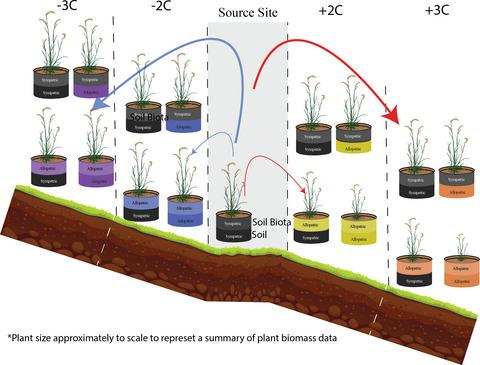当前位置:
X-MOL 学术
›
Glob. Change Biol.
›
论文详情
Our official English website, www.x-mol.net, welcomes your feedback! (Note: you will need to create a separate account there.)
Sympatric soil biota mitigate a warmer-drier climate for Bouteloua gracilis
Global Change Biology ( IF 11.6 ) Pub Date : 2022-08-04 , DOI: 10.1111/gcb.16369 Michael J Remke 1, 2 , Nancy C Johnson 3 , Matthew A Bowker 2
Global Change Biology ( IF 11.6 ) Pub Date : 2022-08-04 , DOI: 10.1111/gcb.16369 Michael J Remke 1, 2 , Nancy C Johnson 3 , Matthew A Bowker 2
Affiliation

|
Climate change is altering temperature and precipitation, resulting in widespread plant mortality and shifts in plant distributions. Plants growing in soil types with low water holding capacity may experience intensified effects of reduced water availability as a result of climate change. Furthermore, complex biotic interactions between plants and soil organisms may mitigate or exacerbate the effects of climate change. This 3-year field experiment observed the performance of Bouteloua gracilis ecotypes that were transplanted across an environmental gradient with either sympatric soil from the seed source location or allopatric soil from the location that plants were transplanted into. We also inoculated plants with either sympatric or allopatric soil biotic communities to test: (1) how changes in climate alone influence plant growth, (2) how soil types interact with climate to influence plant growth, and (3) the role of soil biota in mitigating plant migration to novel environments. As expected, plants moved to cooler-wetter sites exhibited enhanced growth; however, plants moved to warmer-drier sites responded variably depending on the provenance of their soil and inoculum. Soil and inoculum provenance had little influence on the performance of plants moved to cooler-wetter sites, but at warmer-drier sites they were important predictors of plant biomass, seed set, and specific leaf area. Specifically, transplants inoculated with their sympatric soil biota and grown in their sympatric soil were as large as or larger than reference plants grown at the seed source locations; however, individuals inoculated with allopatric soil biota were smaller than reference site individuals at warmer, drier sites. These findings demonstrate complicated plant responses to various aspects of environmental novelty where communities of soil organisms may help ameliorate stress. The belowground microbiome of plants should be considered to predict the responses of vegetation more accurately to climate change.
中文翻译:

同域土壤生物群缓解了细细布特卢亚温暖干燥的气候
气候变化正在改变温度和降水,导致广泛的植物死亡和植物分布的变化。由于气候变化,在持水能力低的土壤类型中生长的植物可能会受到水供应减少的加剧影响。此外,植物和土壤生物之间复杂的生物相互作用可能会减轻或加剧气候变化的影响。这项为期 3 年的田间实验观察了细布特鲁亚的表现跨环境梯度移植的生态型,来自种子源位置的同域土壤或来自植物移植位置的异域土壤。我们还用同域或异域土壤生物群落接种植物来测试:(1)气候变化如何影响植物生长,(2)土壤类型如何与气候相互作用以影响植物生长,以及(3)土壤生物群的作用减轻植物向新环境的迁移。正如预期的那样,转移到较凉爽潮湿的地点的植物表现出增强的生长。然而,移到温暖干燥地点的植物的反应因土壤和接种物的来源而异。土壤和接种物的来源对移至较冷潮湿地点的植物的性能影响不大,但在温暖干燥的地方,它们是植物生物量、种子组和特定叶面积的重要预测因子。具体而言,接种同域土壤生物群并在同域土壤中生长的移植物与在种子源位置生长的参考植物一样大或更大;然而,接种异域土壤生物群的个体比温暖、干燥地点的参考地点个体小。这些发现证明了植物对环境新奇的各个方面的复杂反应,其中土壤生物群落可能有助于缓解压力。应考虑植物的地下微生物组,以更准确地预测植被对气候变化的响应。接种同域土壤生物群并在同域土壤中生长的移植物与在种子源位置生长的参考植物一样大或更大;然而,接种异域土壤生物群的个体比温暖、干燥地点的参考地点个体小。这些发现证明了植物对环境新奇的各个方面的复杂反应,其中土壤生物群落可能有助于缓解压力。应考虑植物的地下微生物组,以更准确地预测植被对气候变化的响应。接种同域土壤生物群并在同域土壤中生长的移植物与在种子源位置生长的参考植物一样大或更大;然而,接种异域土壤生物群的个体比温暖、干燥地点的参考地点个体小。这些发现证明了植物对环境新奇的各个方面的复杂反应,其中土壤生物群落可能有助于缓解压力。应考虑植物的地下微生物组,以更准确地预测植被对气候变化的响应。这些发现证明了植物对环境新奇的各个方面的复杂反应,其中土壤生物群落可能有助于缓解压力。应考虑植物的地下微生物组,以更准确地预测植被对气候变化的响应。这些发现证明了植物对环境新奇的各个方面的复杂反应,其中土壤生物群落可能有助于缓解压力。应考虑植物的地下微生物组,以更准确地预测植被对气候变化的响应。
更新日期:2022-08-04
中文翻译:

同域土壤生物群缓解了细细布特卢亚温暖干燥的气候
气候变化正在改变温度和降水,导致广泛的植物死亡和植物分布的变化。由于气候变化,在持水能力低的土壤类型中生长的植物可能会受到水供应减少的加剧影响。此外,植物和土壤生物之间复杂的生物相互作用可能会减轻或加剧气候变化的影响。这项为期 3 年的田间实验观察了细布特鲁亚的表现跨环境梯度移植的生态型,来自种子源位置的同域土壤或来自植物移植位置的异域土壤。我们还用同域或异域土壤生物群落接种植物来测试:(1)气候变化如何影响植物生长,(2)土壤类型如何与气候相互作用以影响植物生长,以及(3)土壤生物群的作用减轻植物向新环境的迁移。正如预期的那样,转移到较凉爽潮湿的地点的植物表现出增强的生长。然而,移到温暖干燥地点的植物的反应因土壤和接种物的来源而异。土壤和接种物的来源对移至较冷潮湿地点的植物的性能影响不大,但在温暖干燥的地方,它们是植物生物量、种子组和特定叶面积的重要预测因子。具体而言,接种同域土壤生物群并在同域土壤中生长的移植物与在种子源位置生长的参考植物一样大或更大;然而,接种异域土壤生物群的个体比温暖、干燥地点的参考地点个体小。这些发现证明了植物对环境新奇的各个方面的复杂反应,其中土壤生物群落可能有助于缓解压力。应考虑植物的地下微生物组,以更准确地预测植被对气候变化的响应。接种同域土壤生物群并在同域土壤中生长的移植物与在种子源位置生长的参考植物一样大或更大;然而,接种异域土壤生物群的个体比温暖、干燥地点的参考地点个体小。这些发现证明了植物对环境新奇的各个方面的复杂反应,其中土壤生物群落可能有助于缓解压力。应考虑植物的地下微生物组,以更准确地预测植被对气候变化的响应。接种同域土壤生物群并在同域土壤中生长的移植物与在种子源位置生长的参考植物一样大或更大;然而,接种异域土壤生物群的个体比温暖、干燥地点的参考地点个体小。这些发现证明了植物对环境新奇的各个方面的复杂反应,其中土壤生物群落可能有助于缓解压力。应考虑植物的地下微生物组,以更准确地预测植被对气候变化的响应。这些发现证明了植物对环境新奇的各个方面的复杂反应,其中土壤生物群落可能有助于缓解压力。应考虑植物的地下微生物组,以更准确地预测植被对气候变化的响应。这些发现证明了植物对环境新奇的各个方面的复杂反应,其中土壤生物群落可能有助于缓解压力。应考虑植物的地下微生物组,以更准确地预测植被对气候变化的响应。


























 京公网安备 11010802027423号
京公网安备 11010802027423号